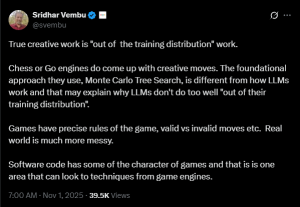Key Takeaways
- Zoho’s Sridhar Vembu argued AI creativity happens ‘out of the training distribution’
- He controversially endorsed a paper linking vaccines to autism, drawing expert criticism
- Medical professionals condemned the study as non-peer-reviewed anti-vaccine propaganda
Zoho co-founder Sridhar Vembu has sparked controversy by endorsing a disputed paper claiming vaccines are a ‘dominant risk factor’ for autism, drawing sharp criticism from healthcare experts. This occurred alongside his technical discussion about AI limitations, where he argued true machine creativity lies ‘out of the training distribution.’
Vembu’s Views on AI Creativity
In a post on X, Vembu compared AI models to chess and Go engines, emphasizing that genuine creative work occurs beyond their training data. He explained that game engines use Monte Carlo Tree Search, fundamentally different from how large language models operate.
“Chess or Go engines do come up with creative moves. The foundational approach they use, Monte Carlo Tree Search, is different from how LLMs work and that may explain why LLMs don’t do too well ‘out of their training distribution’,” Vembu explained.
He noted that games have precise rules, while the real world is ‘much more messy,’ though software code might benefit from game engine techniques.
Vaccine-Autism Controversy Erupts
While Vembu’s AI comments generated discussion, his promotion of a vaccine-autism paper attracted significant scrutiny. The research claimed vaccination is the ‘dominant risk factor’ for autism, a position rejected by the scientific community.
Vembu urged parents to ‘take this analysis seriously,’ commenting: ‘There is increasing evidence that we are giving way too many vaccines to very young children. This is spreading in India too, and we are seeing a rapid increase in autism.’
Medical Experts Push Back
Dr. Philips, a hepatologist known for combating medical misinformation, strongly criticized the study’s credibility. He revealed the authors are known anti-vaccine activists funded by an anti-vaccine organization.
‘The study was published on their own website and has not undergone any peer review or independent scientific scrutiny,’ Dr. Philips emphasized, highlighting the need for proper scientific assessment of public health claims.
Tech Leaders’ Public Responsibility
The incident has renewed focus on the responsibilities of influential tech figures when discussing topics outside their expertise. Vembu’s comments demonstrate how such statements can quickly gain traction and cause public concern in the digital age.
Industry observers note that while open debate drives technological progress, health-related claims require particular caution. The backlash shows the consequences of blurring speculation with established science and underscores the importance of peer review.
As discussions continue about AI creativity and public figure responsibilities, this episode serves as a reminder of the significant impact high-profile voices can have across multiple domains.





